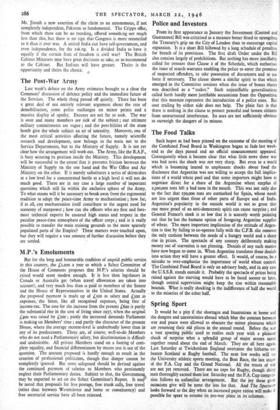M.P.'s Emoluments
But for the long and honourable tradition of unpaid public service in this country, the £r,000 a year to which a Select Committee of the House of Commons proposes that M.P.'s salaries should be raised would seem modest enough. It is less than legislators in Canada or Australia get (when travel allowances are taken into account), and very much less than is paid to members of the Senate and the House of Representatives in the United States. Actually the proposed payment is made up of £5oo as salary and £5oo as expenses, the latter, like all recognised expenses, being free of income-tax. The case for the increase from the present £600 is partly the substantial rise in the cost of living since 1937, when the original £400 was raised by £200 ; partly the increased demands Parliament is making on Members' time ; and partly the character of the present House, where the average income-level is undoubtedly lower than in any of its predecessors. There are, of course, well-to-do Members who do not need a Parliamentary salary, but discrimination is difficult and undesirable. All private Members stand on a footing of com- plete equality, and financial differentiation by means test is out of the question. The amount proposed is hardly enough to result in the creation of professional politicians, though that danger cannot be completely ignored. But some safeguard should be devised against the continued payment of salaries to Members who persistently neglect their Parliamentary duties. Subject to that, the Government may be expected to act on the Select Committee's Report. It may be noted that proposals for free postage, free trunk calls, free travel (other than between Westminster and home or constituency) and free secretarial service have all been rejected.






























 Previous page
Previous page